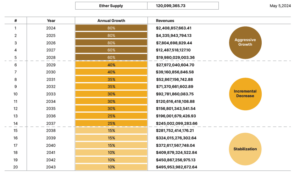Ethereum, a groundbreaking platform in the crypto world, has far surpassed the traditional boundaries of blockchain technology. Originally designed for peer-to-peer payments similar to the bitcoin model, Ethereum has revolutionized the possibilities of blockchain through smart contracts.
To understand this transformation, we can explain it with an urban analogy to blockchain. The Ethereum blockchain has created a thriving ecosystem, led by its decentralized financial district (DeFi). A central component of this ecosystem is Ether (ETH), the native cryptocurrency of the Ethereum network. Much like oil powers machines, Ether powers the platform. Users must pay a "gas fee" in the form of ETH for every transaction they perform on the platform.
Valuation of Ether (ETH)
A key challenge for investors is the valuation of cryptocurrencies such as Bitcoin or Ethereum. The valuation of bitcoin is particularly challenging due to its lack of yield, which requires the use of comparative valuation methods.
Ethereum, on the other hand, uses a Proof-of-Stake (PoS) system in which validators stake ETH to earn recurring returns from network activity. Therefore, Ethereum can be valued using the Discounted Cash Flow (DCF) method. This method takes into account estimated future cash flows, which in this case are generated by transaction fees and staking returns. While the accuracy of any DCF model is highly dependent on the underlying assumptions, this approach demonstrates that traditional valuation frameworks can indeed be adapted for some assets in the crypto space.
 Ether revenues with continuous growth / Source: 21Shares Research Report on Ethereum
Ether revenues with continuous growth / Source: 21Shares Research Report on Ethereum
Fair value of Ether
Assumptions about the discount rate play a crucial role in the valuation of cryptocurrencies such as ETH. In business valuation, the discount rate is the deduction used to determine the present value of future cash flows, reflecting the time value of money and investment risk. A lower discount rate implies a higher present value for Ethereum, while a higher discount rate implies a lower value.
Using a discount rate of 9.70% (the average annual return of the Invesco QQQ Trust ETF over the past 10 years), we derive an implied price for ETH of approximately $6,974. This would be a significant increase from the current price of $3,132. Using a higher discount rate of 20.88% (determined using the Fama and French three-factor model), the implied price would be approximately $1,912. Investors must interpret such valuations with caution and make their own assumptions about future cash flows and risk premiums.
![]()
Ether valuation based on discount rate / Source: 21Shares Research
In summary, Ethereum is not only a technological innovation, but also sets new standards for the valuation and understanding of cryptocurrencies. The use of staking returns and transaction fees as proxies for future cash flows shows that traditional valuation frameworks can be adapted.







